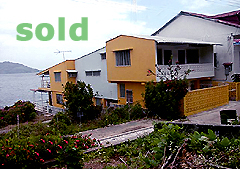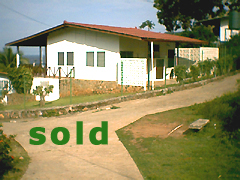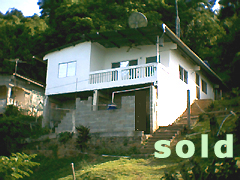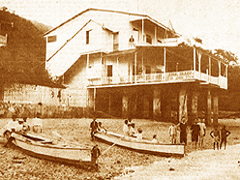.
The Panamanian
economy is perhaps the most stable in the Latin American region principally
because the economy is not only tied to US currency, it's the only currency
that's used. The official name for Panamanian currency is the Balboa. However,
the name Balboa is nothing more than a name. The Balboa is the US
Dollar. You will have US Dollars in your pocket; you will have US Dollars
in your bank account; you will write checks in US Dollars; you will use
them to buy milk, bread, vegetables, gasoline, pay your bills, and purchase
your property. You will never deal with any other currency, because there
isn't any other paper currency in Panama. Because of that, low consumer
prices haven't changed much in many years, and it will be cheaper for you
to live in Panama for many years to come. Furthermore, unlike any country
that doesn't use US Dollar currency, Costa Rica as an example, when you
travel, there is no limit on the amount of US Dollars you can take out
of a bank in Panama simply because there is no currency exchange as in
other counties.
For purchasing
your property, you will have to wire transfer your investment capital for
deposit into a Panamanian bank. A wire transfer is necessary because most
countries have a limit to the amount of national currency you are allowed
to take out of the country. The US, for example, has a US$10,000
limit. Of course, why would you travel with more than that amount
in cash. Making a wire transfer is efficient and smart, and it's
simple and secure. Your bank in Panama will direct you on how to do it.
A wire transfer usually takes about three days. For daily needs,
there's no need to keep wiring capital. Simply arrange to have your
income deposited in your US bank and make withdrawals periodically using
your credit card Plus advantage at any ATM machine in Panama.
As a property
tax advantage, ownership of real estate in Panama equates to tax savings.
If you decide to build, you can apply for a new home exemption of taxes
for the first 20 years. On top of that, not only are you tax exempt for
properties valued under $20,000 but any such taxes above that (if declared),
are frozen at that amount until you resell.
Here are the
steps to purchasing property. You'll see that much of the purchasing process
is identical in nature to in the US. The bottom line is Panamanians, just
like citizens of other nations including the US, have been buying, selling,
and transferring property for centuries. Safeguards against fraudulent
activities were set in place to protect your purchase long long ago. Before,
during, and after the purchase of your property, you can rest assured that
your interests, and those of the seller, are protected by legislated law.
The property
you intend to buy should be titled in the owner's name. When you buy the
property, the title is transferred to your name and recorded in the National
Registry. From that point on the property is yours. Titled Property is
the only kind of property you should buy and sell. You will know a property
is titled if it is recorded in the National Registry.
These five
steps are the steps needed to purchase real estate property in Panama:
Step 1:
Agreement and Research
You've found
your property and have agreed on a price with the owner. Next, you inspect
the title in the National Registry. The property title comes in the
form of the Panamanian "Escrituras." This document states the owner
and description of the property. The seller has to also provide a map describing
the size and its location. You also request a recent “Certificado de Registracion”
which is similar to a title search in the US. This document will indicate
if there are any leans or other legal complications against the property.
All documents must be originals and have the signatures and stamps from
the registration office. At the end of this step, you've confirmed the
owner of the property and its location, and you've determined there are
no existing leans or other legal complications against the property.
Step 2:
Bill of sale & Taxes
The seller
and the purchaser, go to the nearest city and obtain a form for a “bill
of sale.” This document lists the seller and buyer and is basically used
for sales tax purposes. You will receive a receipt and a copy of the form.
Then you're off to the nearest Notary Public with your representative agent
and the seller to transfer the title of the property.
Step 3:
Title Transfer
First, a note
about Notary Publics in Panama and elsewhere in the region. A Notary Public
in Panama does a lot more, is granted far more responsibility than a Notary
Public in the US. A Notary Public in Panama, and also in other countries,
is a high ranking official. In many countries, only lawyers can be Notary
Publics. Government run Notary Publics have the final authority in regards
to any legal transactions. Whether it be buying property or making a legal
contract, they do it all.
The old title,
all previous land documents, and the new tax form are presented to the
Notary Public with a minimal fee. The Notary in turn takes all the appropriate
data, including that of the new owner, and types up the new title with
the new owner's name, the seller, a description of the property, the location
of the property, any special terms that may apply, etc. These documents
then go into the Chief Notary’s office for final approval.
Step 4:
Transfer of Funds for Purchase
Once the Chief
Notary has signed these documents, it is then and only then that funds
transfer hands. Payment is preferable by a certified check on a bank in
Panama, the one you've wire transferred money to. If a third party is involved
then any commission or service charge in the form of a certified check
are also to be made. Same as in the US.
I've also known
buyers to complete steps 1, 2, and 3 before wire transferring the funds
for purchase. That involves putting up a deposit, usually about 3% of the
sale price, and the buyer and seller signing a document stating that the
balance is due once steps 1, 2, and 3 have been completed. In many cases,
the buyer can authorize the bank that receives the wire transfer to disperse
the balance once these steps have been satisfactorily met. You can bet
the bank will help you double check all is in order before turning over
the balance in Step 4.
Step 5:
The National Registry
Nothing gets
done or completed in Panama until it is submitted to the National Registry
and duly recorded. This is true whether it be a birth, death, marriage,
divorce or buying property. This process normally takes several weeks but
can be speeded up by having the documents hand delivered and presented
to the main office of National Registry in Panama City. Once you have the
title in your hands with all the appropriate signatures and stamps, the
property is yours. |






